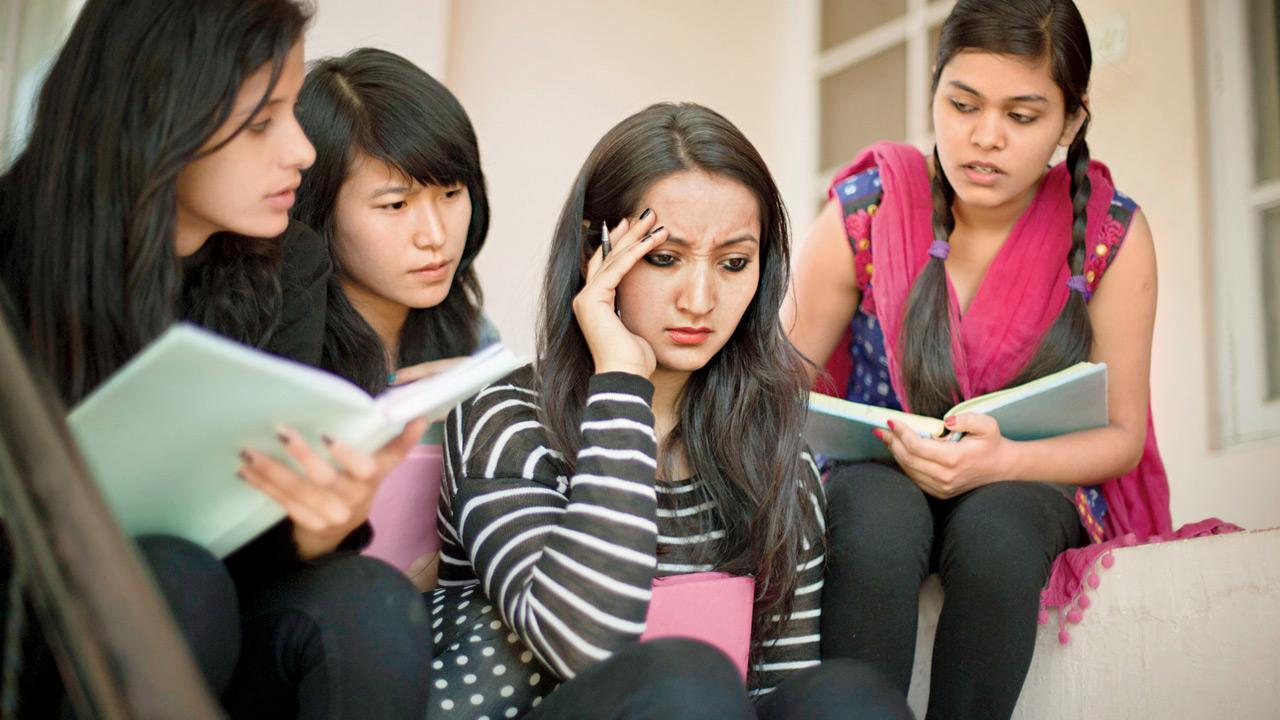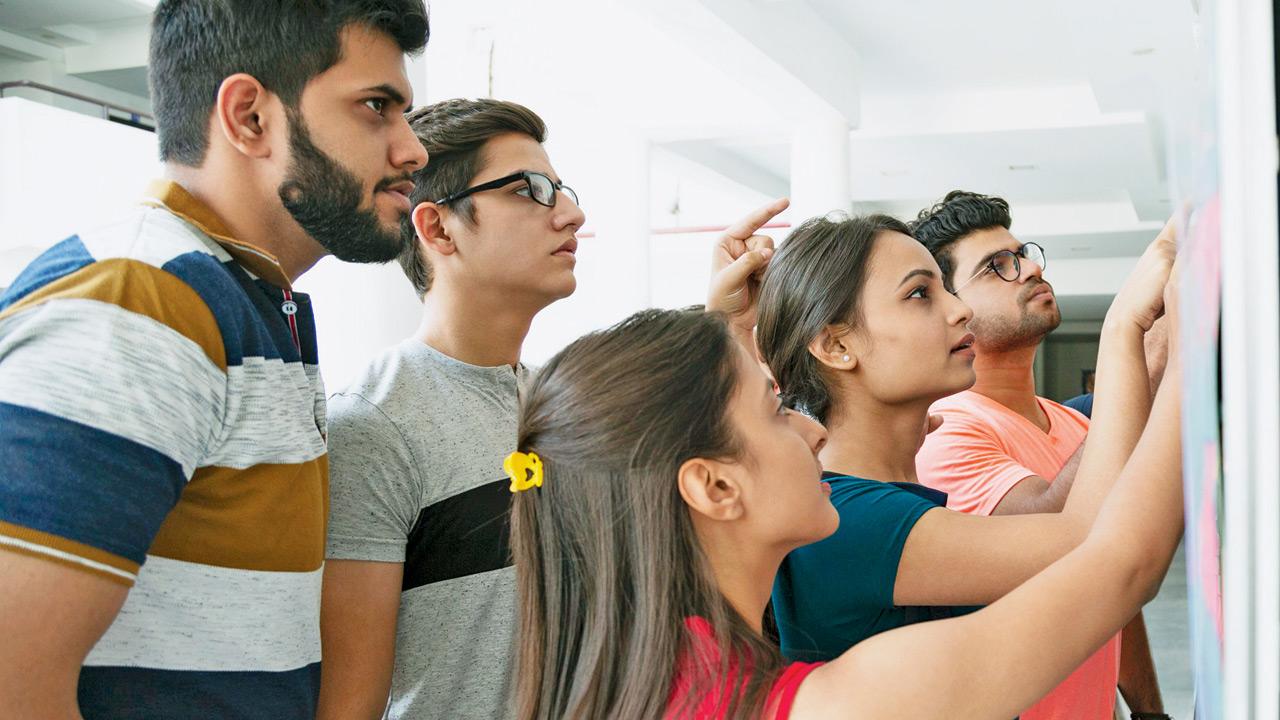Following widespread frustration among students, and criticism from teachers, Exam and Evaluation Department’s online system comes under scrutiny for repeated errors and inefficiencies

Teachers believe old offline method ensured better accountability and accuracy. Representation pic/istock, Ashish raje
Citing administrative failures and errors in evaluating exam answer sheets, University of Mumbai (MU) teachers are demanding a return to offline evaluations. Despite the shift to online assessment, the number of students applying for re-evaluation remains consistently high, showing no signs of decline even in the 2024-25 academic year. The high percentage of students passing after a re-evaluation has raised serious concerns about the accuracy of the initial assessment. Faculty members argue that the current system lacks overseeing, leading to unchecked errors.
ADVERTISEMENT

Reverting to offline evaluation would mean returning to the pre-2017 system, where teachers physically checked answer sheets before sending them for moderation. Teachers believe this method ensured better accountability and accuracy. However, some faculty members argue that full moderation is needed, even if online evaluation continues.
Exam dept under scrutiny
MU’s Examination and Evaluation Department—commonly called the Examination House—is facing renewed criticism for repeated errors. In a recent senate meeting, professors flagged the growing number of complaints, forcing the university to acknowledge the issue.
15K students seek re-evaluation
After the winter 2024 semester results, around 15,000 students applied for re-evaluation, with 11,000 cases resulting in revised scores. The alarming correction rate has intensified calls for an overhaul of the examination system.
One student, who failed the Indian Citizen Security Code subject with 21 marks, later discovered that responses worth 30 marks had not even been checked. Frustrated, he filed an official complaint. In another case, a Master’s in Management student found her online result marked as ‘failed’ despite never receiving a marksheet. After re-evaluation, she was declared ‘passed’ but was asked to submit her original mark sheet—which she never received—to get the revised one.

After the winter 2024 semester results, 15,000 students applied for re-evaluation, with 11,000 cases resulting in revised scores. Representation pic/istock
During the summer 2024 semester, 17,467 students applied for re-evaluation, with 8960 receiving revised marks—an error correction rate of 51 per cent. Some courses saw even higher discrepancies: In the three-year LLB programme’s sixth semester, 243 students applied, and 219 saw their marks revised. In the third-year Arts course’s fifth semester, 1590 students applied, and 1311 got modified scores. For the winter semester, the number of applications dropped slightly, but the percentage of revised scores shot up to 73 per cent.
Students bear financial burden
MU charges Rs 150 to Rs 350 per paper for re-evaluation, placing an additional financial burden on students. In 2022-23 alone, the university collected Rs 4.55 lakh in re-evaluation fees and Rs 43,060 for photocopies of answer sheets.
Professor Vijay Pawar, president of the Maharashtra Union of Secular Teachers (MUST), highlighted that only 15-20 per cent of papers are randomly moderated, leaving many unchecked. “We often see students initially getting 10-20 marks, but after re-evaluation, their scores jump to 40-50. This raises serious concerns about accuracy,” Pawar said, pushing for a return to offline evaluations.
RTI exposes evaluation flaws
A 2024 RTI reply revealed that more than half of the students who applied for re-evaluation in early 2023 passed after reassessment. In late 2022, 45 per cent of students who sought revaluation had their results changed. Pune-based activist Vihar Durve, who obtained the data, slammed MU for failing to provide faculty-wise transparency. “The university must ensure error-free assessments. Students shouldn’t have to fight for accurate marks,” said MU senate member Pradeep Sawant.
The ordeal
Every year, thousands of students who receive low marks or fail their exams request photocopies of their answer sheets to verify their grading before applying for revaluation. Many who initially fail ultimately pass after reassessment, exposing flaws in the initial evaluation. A law student shared, “Failing an exam causes immense distress. We then have to request a photocopy, apply for revaluation, and wait. It’s not just about the fees but also the stress and wasted time.”
Another student pointed out that revalued marks are often not considered for university rankings or awards. “My aunt lost out on a top rank years ago due to a low initial score. After revaluation, she topped, but the university never updated the topper list. Who takes responsibility for such mistakes?”
“The numbers expose Mumbai University’s deeply flawed assessment system,” said Sawant. “The process of obtaining photocopies, verifying errors, and applying for revaluation is time-consuming and unfair to students. The university must ensure accurate evaluations.”
Activist Vihar Durve stressed the need for accountability. “Repeated errors have jeopardised students’ futures. A proper evaluation must be guaranteed, affected students should be compensated, and a CAG performance audit should be made mandatory.”
University’s justification
Defending the process, university officials stated that each paper undergoes two rounds of assessment by different teachers, leading to occasional score variations. They assured that corrections identified during revaluation are implemented to ensure fairness.
Evaluation process
Pre-2017 System
>> Teachers received physical answer sheets for evaluation.
>> Papers were checked and returned to the university.
>> A moderator reviewed the assessments for accuracy.
Post-2017 System
>> Answer sheets are scanned and uploaded for online evaluation.
>> Teachers log in using credentials provided by the university.
>> The online system allows marking, annotation, and submission.
Online assessment update status
>> Faculty access the system using their mobile number and email ID.
>> Authentication is done via a one-time password (OTP).
>> Evaluators must annotate all answers before submission.
>> A green tick indicates completion, allowing final submission.
 Subscribe today by clicking the link and stay updated with the latest news!" Click here!
Subscribe today by clicking the link and stay updated with the latest news!" Click here!







